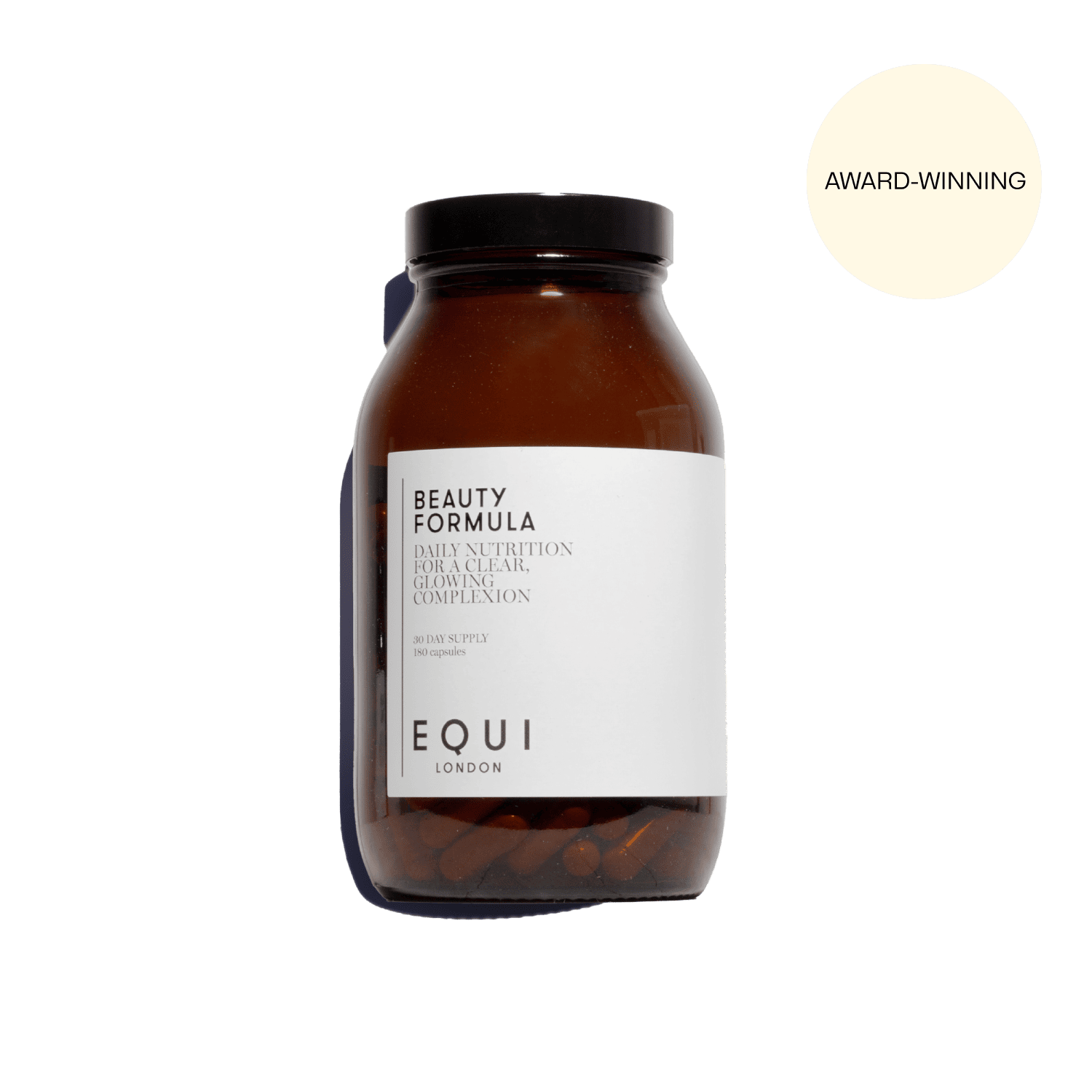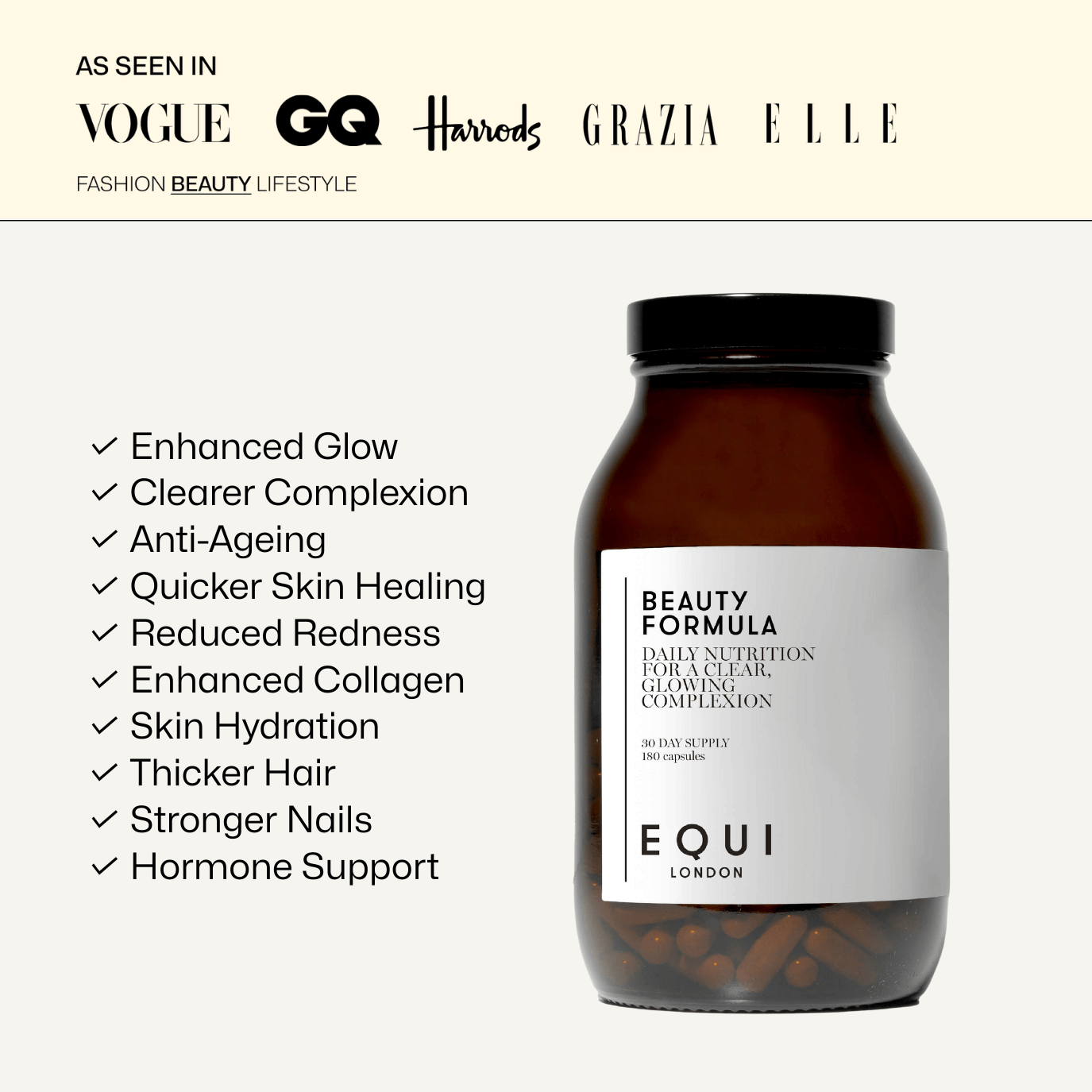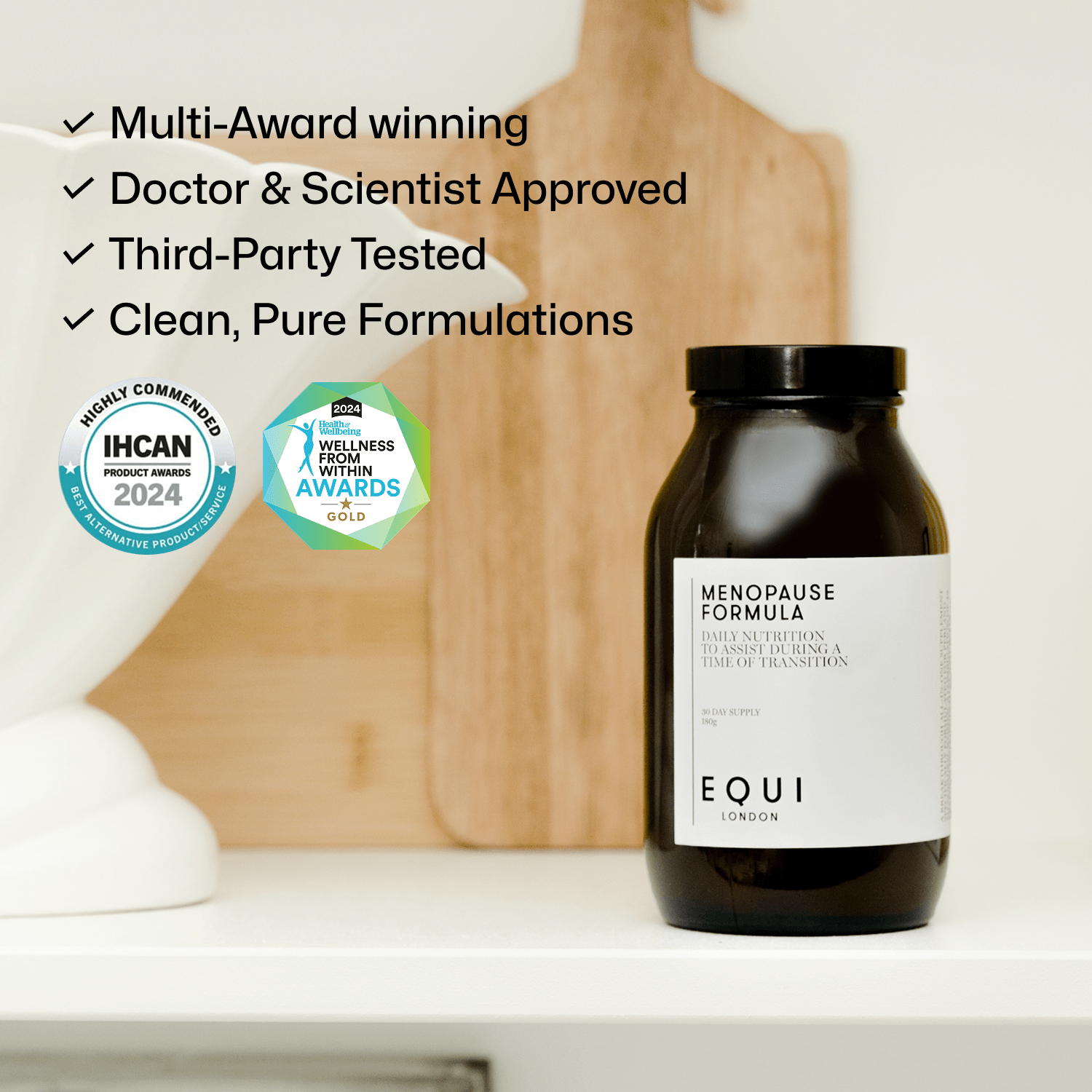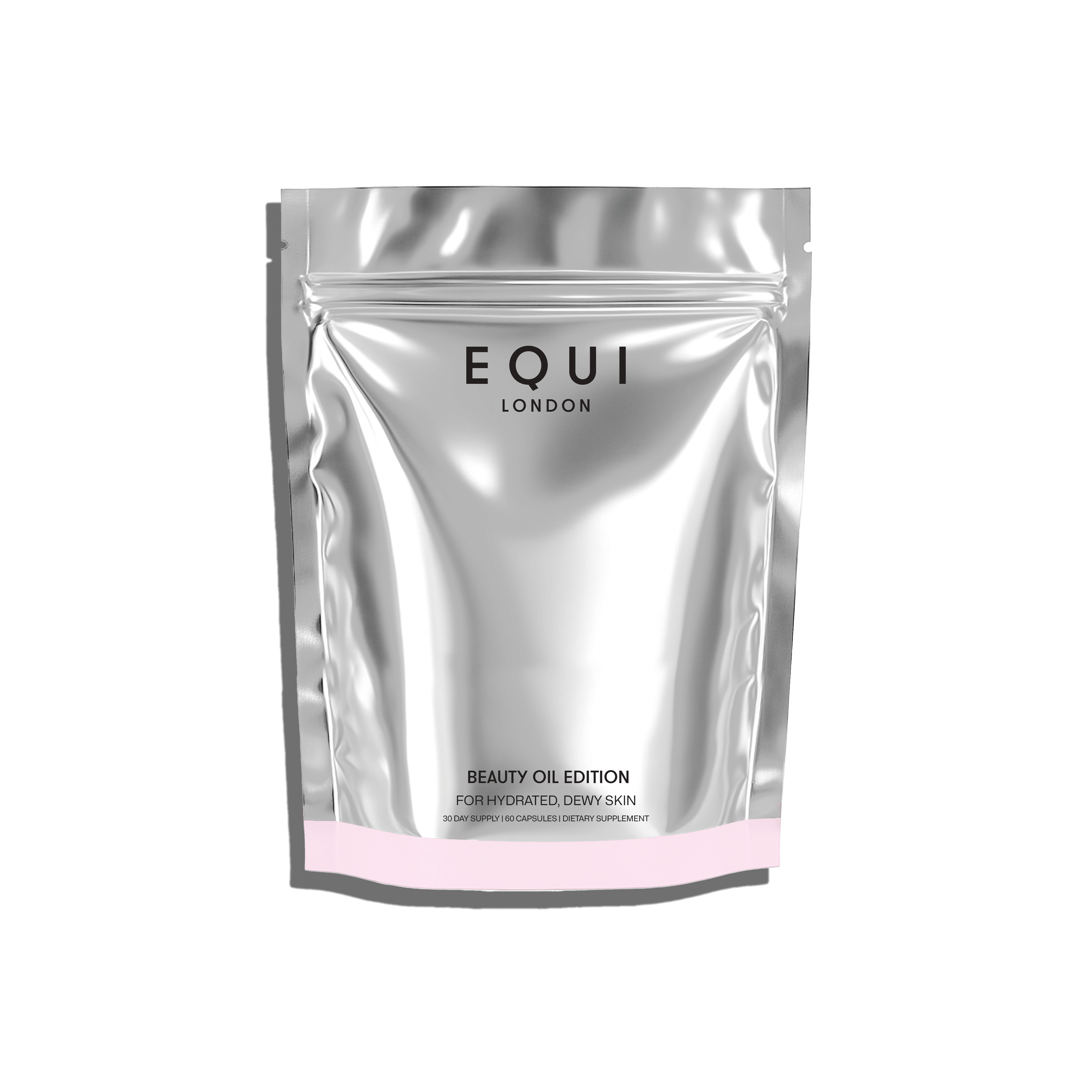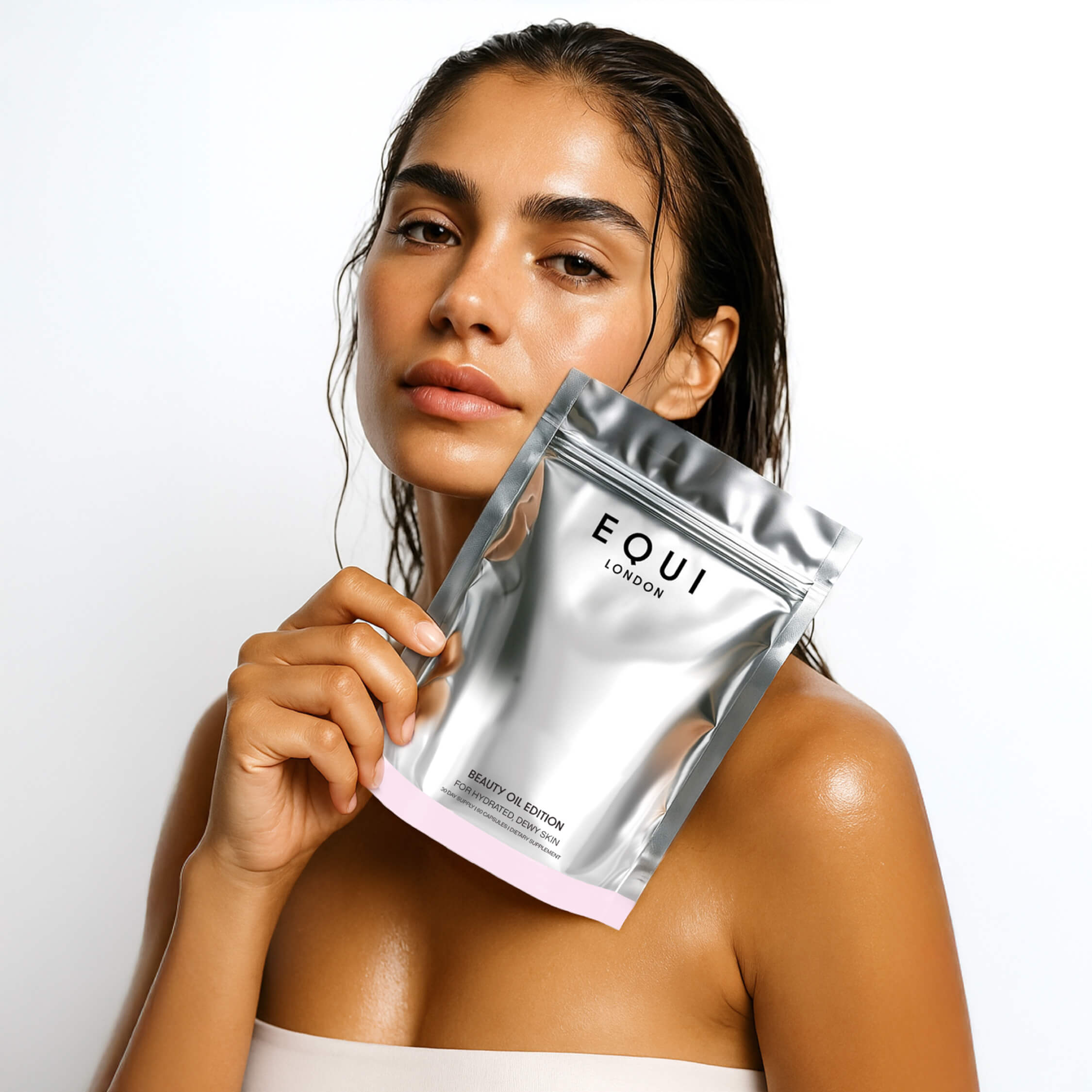
Is Collagen Really The Best Supplement For Skin?
Collagen supplements are bigger than ever and whether it be for skin, joints, hair, gut health or anti-ageing, many people are turning to liquid or powdered products, and even drinks and sweets with added collagen.
And for good reason - because there is compelling research on the benefits of consuming more collagen, especially for when it comes to skin health and the anti-ageing.
But is it really all your skin needs supplement wise? What if anti-ageing isnt your concern but skin conditions are? Are there other things we can take to enhance our own collagen production and what else can make our skin glowing, clear and bright?
Here we cover all of these commonly asked questions and tell you about the other ingredients that are less famous, harder to come by, but just as effective.
What is collagen?
Collagen is the most abundant protein in the body, accounting for as much as 30% of the total protein mass in the body and 80% in the skeleton (1). It’s responsible for maintaining healthy joints, skin health, bone and skin structure.
Whilst nearly 28 different types of collagens have been identified, collagen type I is the most common form found in skin, bone, teeth, tendon, ligaments, vascular ligature, and organs (2). Type II is present in cartilage whilst Type III is found in the skin, muscle and blood vessels, accounting for 20% of the total collagen concentration in the skin (3). Type IV is found within the layers of skin and helps to draw out impurities. New research has shown that Type V is present in the placenta.
How does supplementing collagen help skin?
Whilst we naturally produce collagen ourselves, this production does begin to decline from the age of around 25, which is when you may start to notice wrinkles and possibly some aches and pains. Modern diets no longer include good amounts of natural sources of collagen, which is found in foods like bone broth, animal skin, and organ meats. This is why we advocate adding some collagen in for skin supplementation.
You may have heard that ingesting collagen doesn’t make a difference to the body because we cant absorb it, however recent studies show that collagen type 1 peptides have a particularly high absorption rate (4), supporting its use as a supplement.
What else do we need to make collagen in the skin?
This is a subject that our in-house nutritionist (and lover of all things skin health) Alice Mackintosh regularly discusses, because it so often gets missed.
She explains - "our bodies naturally produce collagen themselves and this is something we are actually very good at, as long as we provide the right nutrients through the diet to support this process adequately. Though taking collagen can help, the best results come when we support the body to do what it naturally wants to do."
What else do we need to feed the skin to make this process efficient? "The body cannot make collagen if we don't supply it with protein, vitamin C, zinc and sulphur. All of these things help to build our collagen, but remember that if we are using them up elsewhere or not getting enough in via the diet, this process can slow down. For example if you're running marathons, not getting enough sleep, regularly coming down with colds, working long hours, and not supporting your body with adequate nutrients, your skin might not produce collagen particularly effectively."
"It's also a good idea to think about what we can do to keep that collagen healthy - anti-oxidants and healthy fats are key here to prevent collagen degradation, reduce inflammation."
So even if you take collagen orally, you likely wont get the most from it if you're not suppling the body with the right nutrients to build it and preserve it?
"Yes that's right, and though the rates of collagen production do fall as we get older, other factors will accelerate the process, such as stress, inflammation, sugar intake, alcohol, smoking, pollution and sun damage."
Another thing that can accelerate this loss of collagen is a lack of anti-oxidants in your diet, and if you want to learn more about what anti-oxidants do what for your skin and where to find them in food, check out our handy anti-oxidants cheat sheet here.
What other supplements are worth trying for the skin?
There are loads of other things to be considering than just collagen, and if you're only taking this, you might not be giving yourself the best chance of getting that ex-factor skin, especially if you have skin conditions.
Here is our skin specialist nutritionist's top recommendations for other supplements that have been scientifically shown to support skin:
Vitamin C, zinc - as we've already said, both vital for producing collagen in the skin, helping it to heal and reducing scars. Zinc is also needed for hormone support and can help with acne. These are carefully combined with collagen in our GlowCutis® blend, which is only found in Beauty Formula.
Though taking collagen can really help, the best results come when we support the body to do what it naturally wants to do to nourish and support our skin from the inside out." - Alice Mackintosh, registered Nutritional Therapist
Vitamin D - Skin doesn't function without it and deficiencies have been found in those with conditions such as eczema and psoriasis. It helps to keeps inflammation under control, balance hormones and support the all-important microbiome.
Opti-MSM® - MSM is an optimal supplementary form of sulphur, and is wonderful for skin health because the sulphur within it helps to create elastin and collagen, two very important structural components of the skin that help to make skin more supple, elastic and less prone to signs of ageing. This might be why in a study in 2015, significant improvements in skin appearance and condition were found when 20 women took MSM for 4 months1. The benefits of MSM aren’t just related to our skin either – it’s also great for hair and nail health, liver function, and may even help to reduce inflammation and pain in joints2. We add OptiMSM® into our Glow Edition, which is designed to help improve brightness, radiance, enhance collagen production and reduce signs of ageing.
Hyaluronic Acid - As its name suggests, HA is important for binging moisture and hydration to the skin. It's found in high concentrations in the skin naturally, but scientific studies have shown that it might stimulate production of collagen in skin whilst having antioxidant and free radical scavenging effects. It's also been shown to boost hydration, maintain skin elasticity, cushion skin cells reduce inflammation! These are all reasons why we add it into our award-winning Beauty Formula.
Pine bark - One of our favourites, pine bark is an incredibly nourishing antioxidant extracted from French maritime pine trees. Hundreds of trials have been conducted on this ingredient, which is surprising because it’s one that you don’t often hear much about. Research has shown that pine bark can help to improve hydration and elasticity, as well as improving hyaluronic acid levels, and strengthening skin against UV protection3 which is extremely useful for helping to discourage sun damage. Other trials have shown that it may help with pigmentation prone skin, combatting brown marks and patchiness resulting from sun exposed skin.
Lastly, pine bark is great if you have sensitive, red or blotchy skin, because it is a natural anti-histamine and anti-inflammatory. Research has also shown it has positive effects on the cardiovascular system, brain and eye health, as a happy added bonus!
We add premium pine bark to our Beauty Formula and Glow Edition supplements.
Probiotics - Collagen may help with anti-ageing, but what about skin conditions? Though we need to do more research here to understand why, probiotics might be a useful addition in the management of a wide array of skin conditions.
Research has found that people with acne tend to have higher levels of the less favourable gut bacteria such as E-coli, and lower levels of beneficial Bifidobacteria and Lactobacillus (4) so it makes good sense to focus on supporting the gut with good bacteria, as part of the management of blemish-prone skin.
An imbalanced microbiome may also be a contributing factor towards rosacea and supporting this can reduce the symptoms (5, 6). One study also showed that small intestinal bowel overgrowth (SIBO – an imbalance in the microflora found in the small intestine) is 10 times more prevalent in those suffering with acne than in healthy controls (7). Eczema sufferers may also benefit from probiotic intake, and one study found that those supplementing with a strain of Lactobacillus saw 52% reduction in symptom severity (8). It's for this reason that we add probiotics strains into our comprehensive skin supplement, Beauty Formula.
Astaxanthin - When we think of anti-oxidants we often think of brightly coloured veggies and fruit, but the incredibly powerful carotenoid astaxanthin is predominantly found in salmon, lobster, krill, crayfish, brown crab meat and prawns. It’s naturally bright pink or red, which is what gives these foods are their dark pink hue. This is another incredible naturally occurring nutrient that should get more attention for skin but doesn’t. More research is needed, but what we do know is that it is potently anti-inflammatory and great for protecting fatty membranes in found deep within our skin, which helps to keep it hydrated, bouncy and dewy. Helping to keep skin hydrated is essential for preventing premature signs of ageing, and discouraging wrinkle formation. A study in 2018 a randomized, double-blind, placebo-controlled trial also found that it can help with UV induced skin deterioration (9), or sun damage, possibly because of its powerful anti-oxidant activity. Further research has also shown it may help with the management of inflammatory conditions (10). Sign us up!
We love astaxanthin so much that we have developed our krill Beauty Oil Edition capsules (we’ve sourced the most sustainable, safe and marine loving krill available on the market) as a beauty support. Not only are these rich in omega 3, but also astaxanthin (hence the bright red colour) and choline, all of which are brilliant for helping you get skin bright and glowing.
References
- Anthonavage, M. et al. Effects of Oral Supplementation With Methylsulfonylmethane on Skin Health and Wrinkle Reduction. Natural Medicine Journal, 2015.
- Usha & Naidu. Randomized, Double Blind, Parallel, Placebo Controlled Study of Oral Glucosamine, Methylsulfonylmethane and their Combination in Osteoarthritis. Clin Drug Invest, 2004, 24:6 353-363
- Grether-Beck, S.; Marini, A.; Jaenicke, T.; Krutmann, J. French maritime pine bark extract (pycnogenol(r)) effects on human skin: Clinical andmolecular evidence. Skin Pharmacol Physiol 2016, 29, 13-17.10.1159/000441039
- Chernyshova, M.P.; Pristenskiy, D.V.; Lozbiakova, M.V.; Chalyk, N.E.; Bandaletova, T.Y.; Petyaev, I.M. Systemic and skin-targeting beneficial effects of lycopene-enriched ice cream: A pilot study. J Dairy Sci 2019, 102, 14-25.10.3168/jds.2018-15282
- Yan HM, Zhao HJ, Guo DY, Zhu PQ, Zhang CL, Jiang W. Gut microbiota alterations in moderate to severe acne vulgaris patients. J Dermatol. 2018 Oct;45(10):1166-1171.
- Parodi A, Paolino S, Greco A, Drago F, Mansi C, Rebora A, Parodi A, Savarino V. Small intestinal bacterial overgrowth in rosacea: clinical effectiveness of its eradication. Clin Gastroenterol Hepatol. 2008 Jul;6(7):759-64.
- Bowe WP, Logan AC. Acne vulgaris, probiotics and the gut-brain-skin axis - back to the future?. Gut Pathog. 2011;3(1):1.
- Drago L, Iemoli E, Rodighiero V, Nicola L, De Vecchi E, Piconi S. Effects of Lactobacillus salivarius LS01 (DSM 22775) treatment on adult atopic dermatitis: a randomized placebo-controlled study. Int J Immunopathol Pharmacol. 2011 Oct-Dec;24(4):1037-48.
- Ito, N.; Seki, S.; Ueda, F. The protective role of astaxanthin for uv-induced skin deterioration in healthy people-a randomized, double-blind, placebo-controlled trial. Nutrients 2018, 10.10.3390/nu10070817
- Natalya E Chalyk1, Continuous astaxanthin intake reduces oxidative stress and reverses age-related morphological changes of residual skin surface components in middle-aged volunteers. Nutri Res, 2017, 48:40-48.
Disclaimer: As with all information on Equi London, this information is not a substitute for medical advice. No one diet or supplement regime works for everyone and you should always seek help from a GP and registered health expert before making changes to your diet, or before introducing any supplements.
